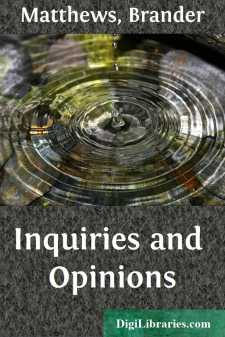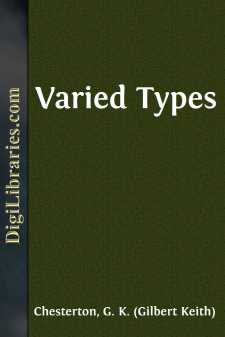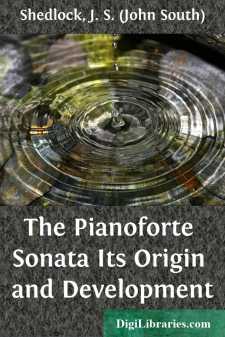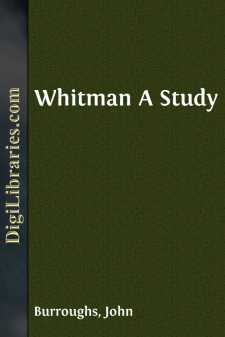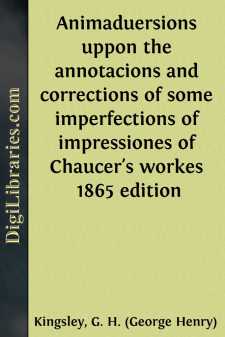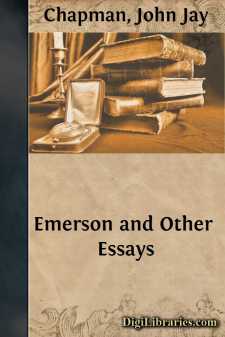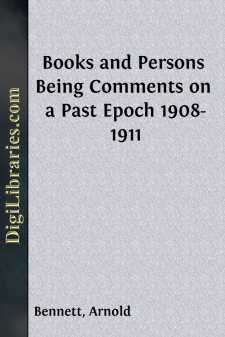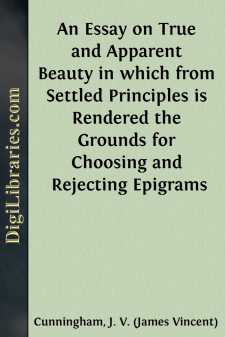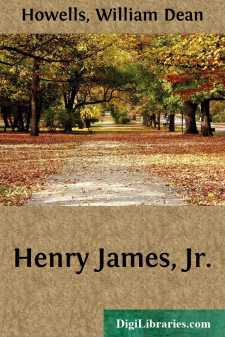Literary Criticism
- American 18
- Ancient and Classical 3
- Asian 1
- Australian & Oceanian 1
- Books & Reading 8
- Caribbean & Latin American 2
- Drama 2
- English, Irish, Scottish, Welsh 49
- European 7
- General
- Horror 1
- Humor 2
- Jewish 2
- Medieval 2
- Middle Eastern 3
- Poetry 7
- Renaissance 6
- Russian & Former Soviet Union 1
- Shakespeare 27
General Books
Sort by:
by:
Brander Matthews
LITERATURE IN THE NEW CENTURY [This paper was read on September 24th, 1904, in the section of Belles-lettres of the International Congress of the Arts and Sciences, held at St. Louis.] There is no disguising the difficulty of any attempt to survey the whole field of literature as it is disclosed before us now at the opening of a new century; and there is no denying the danger of any effort to declare...
more...
CHARLOTTE BRONTË Objection is often raised against realistic biography because it reveals so much that is important and even sacred about a man's life. The real objection to it will rather be found in the fact that it reveals about a man the precise points which are unimportant. It reveals and asserts and insists on exactly those things in a man's life of which the man himself is wholly...
more...
CHAPTER I INTRODUCTORY In history we find certain names associated with great movements: Luther with the Reformation, or Garibaldi with the liberation of Italy. Luther certainly posted on the door of the church at Wittenberg his famous Theses, and burnt the Papal Bull at the gates of that city; yet before Luther there lived men, such as the scholar Erasmus, who have been appropriately named Reformers...
more...
by:
John Burroughs
PRELIMINARY I The writing of this preliminary chapter, and the final survey and revision of my Whitman essay, I am making at a rustic house I have built at a wild place a mile or more from my home upon the river. I call this place Whitman Land, because in many ways it is typical of my poet,—an amphitheatre of precipitous rock, slightly veiled with a delicate growth of verdure, enclosing a few acres...
more...
PREFACE. Although only the grandson of the first of his name, the author of the following interesting specimen of 16th-century criticism came of a family of great antiquity, of so great an antiquity, indeed, as to preclude our tracing it back to its origin. This family was originally known as the “De Botfelds,” but in the 15th century one branch adopted the more humble name of “Thynne,” or...
more...
by:
John Jay Chapman
EMERSON I "Leave this hypocritical prating about the masses. Masses are rude, lame, unmade, pernicious in their demands and influence, and need not to be flattered, but to be schooled. I wish not to concede anything to them, but to tame, drill, divide, and break them up, and draw individuals out of them. The worst of charity is that the lives you are asked to preserve are not worth preserving....
more...
by:
Arnold Bennett
WILFRED WHITTEN'S PROSE 4 Apr. '08 An important book on an important town is to be issued by Messrs. Methuen. The town is London, and the author Mr. Wilfred Whitten, known to journalism as John o' London. Considering that he comes from Newcastle-on-Tyne (or thereabouts), his pseudonym seems to stretch a point. However, Mr. Whitten is now acknowledged as one of the foremost experts in...
more...
INTRODUCTION The following essay forms the introduction to a famous anthology of the seventeenth century, the Epigrammatum delectus, a Port-Royal textbook published at Paris in 1659. The essay was twice translated into French in the same century, but the use of the text in France did not survive, apparently, the downfall of the Port-Royal movement. It was, however, later adopted by Eton College, where...
more...
by:
Joseph Conrad
ALMAYER'S FOLLY I am informed that in criticizing that literature which preys on strange people and prowls in far-off countries, under the shade of palms, in the unsheltered glare of sunbeaten beaches, amongst honest cannibals and the more sophisticated pioneers of our glorious virtues, a lady—distinguished in the world of letters—summed up her disapproval of it by saying that the tales it...
more...
The events of Mr. James's life—as we agree to understand events—may be told in a very few words. His race is Irish on his father's side and Scotch on his mother's, to which mingled strains the generalizer may attribute, if he likes, that union of vivid expression and dispassionate analysis which has characterized his work from the first. There are none of those early struggles with...
more...


